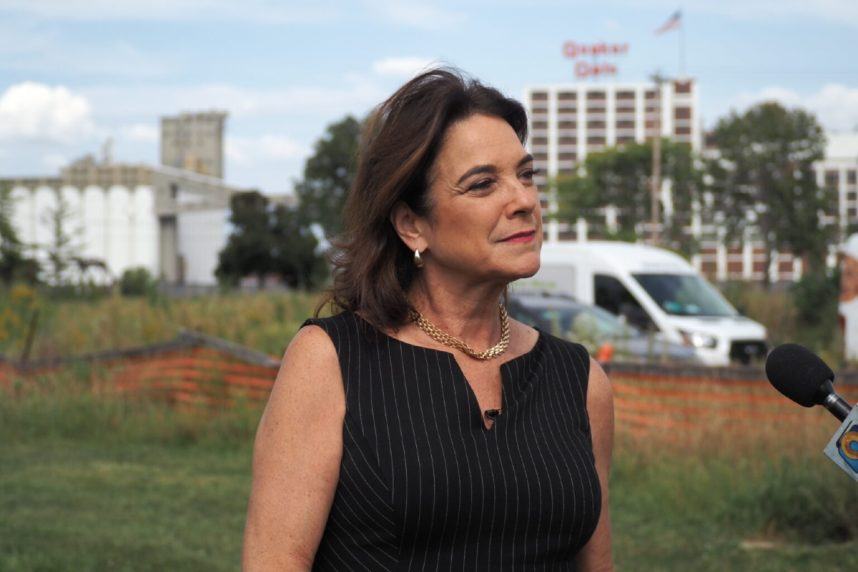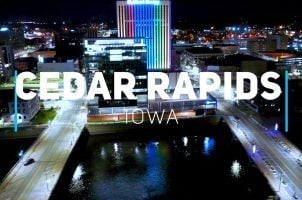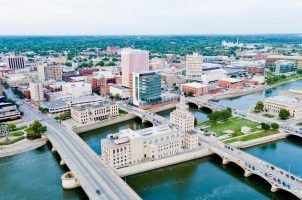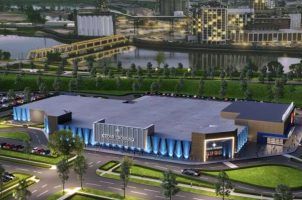Iowa Casinos Push Back Against Cedar Rapids Resort Pitch
Posted on: October 7, 2024, 09:59h.
Last updated on: October 7, 2024, 10:12h.
Casinos currently operating in Iowa are coming out in opposition to a resort scheme floated for Cedar Rapids.

Iowa is home to 19 commercial brick-and-mortar, riverboat, and racetrack casinos. A group of businesspeople in Cedar Rapids — in partnership with California-based Peninsula Pacific Entertainment — hope to build the state’s 20th casino destination, but Iowa’s current gaming operators aren’t too enthusiastic about additional competition.
Several casinos rely heavily on traffic from Cedar Rapids. The Isle Casino Hotel in Waterloo, Q and Diamond Jo casinos in Dubuque, Clinton’s Wild Rose, and Riverside Casino are all within 75 miles of the state’s second-most populated city.
The Cedar Rapids Development Group (CRDG), the proposed developers of the Cedar Crossing Casino, has for more than a decade been kept out of the state gaming market on saturation concerns. Despite Cedar Rapids residents voting in support of a casino during local referendums in 2013 and again in 2021, the Iowa Racing and Gaming Commission (IRGC) has repeatedly rejected the consortium’s casino license application.
In 2022, state lawmakers took matters into their own hands when they placed a two-year moratorium on new gaming concessions being issued. The moratorium expired as of July 1 and CRDG promptly reignited its fight to bring a Las Vegas-style casino floor to the Eastern Iowa city.
Casino Pushback
Last week, the CRDG and its charitable arm, the Linn County Gaming Association, formally presented its $275 million investment blueprint to the state gaming agency. After discussing the project, the IRGC opened up the meeting to hear concerns from current gaming entities.
Alex Dixon, president and CEO of Q Casino, said allowing a casino in Cedar Rapids would unquestionably hurt his Dubuque business, as well as casinos in Riverside and Waterloo. Boyd Gaming, which owns and operates the Diamond Jo, said a Cedar Rapids casino would “have a negative impact on Dubuque and other markets.”
IRGC research concluded similar consequences. A feasibility study commissioned by the state gaming agency reported last month that the Cedar Crossing Casino would poach play from current casino properties.
Proponents of the undertaking say Cedar Rapids should be allowed to benefit from gaming just as many other cities and towns do.
The data indicates more than ever that the time is now for an additional casino and I have every reason to believe that this commission, knowing they rely on data, will see that,” said Cedar Rapids Mayor Tiffany O’Donnell. “And that’s all we can ask for, all we’ve ever asked for, was just a fair shot.”
The IRGC feasibility review concluded that a casino in Cedar Rapids would generate almost 26% of its annual gaming revenue from play that would have otherwise been realized at existing Iowa casinos.
Critical Timeline
Time is of utmost importance in setting the odds on whether the Cedar Crossing Casino is greenlit. The IRGC plans to vote on the casino submission in early February, about three weeks after the Iowa Legislature convenes for its 2025 session.
State lawmakers say they’ll file a casino moratorium bill around the January 13 convening of their next session. With weekends and the Martin Luther King. Jr. holiday on January 20, the legislature will have just 16 session days to pass the gaming moratorium and have Gov. Kim Reynolds (R) sign the casino license prohibition.
If the IRGC approves the casino before a moratorium bill fields Reynolds’ signature, the permit’s issuance would remain valid.
Related News Articles
Cedar Rapids Casino Project Continues to Gain Support in Iowa
Cedar Rapids Casino Developers to Apply for Iowa Gaming License
Cedar Rapids Casino Would Feature Zach Johnson Restaurant and STEM Lab
Most Popular
IGT Discloses Cybersecurity Incident, Financial Impact Not Clear
What ‘Casino’ Didn’t Tell You About Mob Wife Geri Rosenthal
Caesars Virginia in Danville Now Accepting Hotel Room Reservations
Fairfax County Officials Say No NoVA Casino in Affluent Northern Virginia
Most Commented
-
Caesars Virginia in Danville Now Accepting Hotel Room Reservations
— November 27, 2024 — 6 Comments -
VEGAS MYTHS RE-BUSTED: Casinos Pump in Extra Oxygen
— November 15, 2024 — 5 Comments -
LOST VEGAS: The Historic Holy Cow Casino
— November 29, 2024 — 4 Comments -
VEGAS MYTHS RE-BUSTED: The Final Resting Place of Whiskey Pete
— October 25, 2024 — 3 Comments
















Last Comments ( 4 )
As a former employee at Riverside Casino, I can't tell you how often management made fun of Cedar Rapids wanting to put in its own casino. With all their donations to Kim Reynolds, there was a lot of confidence that nothing would come of those development plans. I used to remind employees that a Cedar Rapid resort would be good for them because they would now be more valuable employees. Riverside would have to pay them better wages to keep them from jumping ship. (Feel free to ask a card dealer how much they are paid hourly, minus tips.)
The casinos just don't want to compete. The state doesn't prevent a convenience store chain or fast food joint from opening up across the street from a competitor.
We would love to have a casino here in cedar rapids! We love to gamble and have fun and can afford it, however we don't want to drive a hour to do it!
Cedar rapids is always the last to get anything it's time for the governor to back v cedar rapids I go to River side casino and they treat cedar rapids people like out siders there not very good to cedar rapids at all